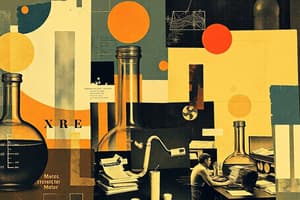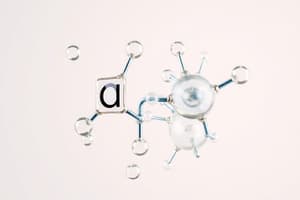Podcast
Questions and Answers
What are the three states of matter?
What are the three states of matter?
- Gas, liquid, vapor
- Solid, liquid, gas (correct)
- Solid, gas, condensation
- Solid, liquid, plasma
Which of the following best describes a chemical change?
Which of the following best describes a chemical change?
- A modification of temperature only
- A change in size or shape
- A transformation that results in new substances (correct)
- A reversible change in physical state
What defines redox reactions?
What defines redox reactions?
- Reactions that produce heat
- Reactions involving the transfer of electrons (correct)
- Reactions that absorb energy
- Reactions that only occur in acids
How do acidic solutions affect hair?
How do acidic solutions affect hair?
What is a defining characteristic of emulsions?
What is a defining characteristic of emulsions?
Which type of shampoo is designed for oily hair?
Which type of shampoo is designed for oily hair?
What does the pH scale measure?
What does the pH scale measure?
Which type of shampoo contains an active chelating agent?
Which type of shampoo contains an active chelating agent?
What defines a compound molecule?
What defines a compound molecule?
What is an example of an effect of alkaline solutions on hair?
What is an example of an effect of alkaline solutions on hair?
Flashcards are hidden until you start studying
Study Notes
Chemistry Fundamentals
- Organic chemistry deals with carbon-containing compounds, while inorganic chemistry encompasses all other chemical compounds.
- The three states of matter are solid, liquid, and gas.
Comparing Matter
- Elements are pure substances consisting of only one type of atom. Atoms are the smallest units of elements with chemical identity.
- Compounds are substances formed from two or more different elements chemically bonded. Mixtures consist of two or more substances combined physically, not chemically.
Changes in Matter
- Matter can undergo physical changes (altering form without changing composition) and chemical changes (where new substances are formed).
Redox Reactions
- Oxidation-reduction (redox) reactions involve the transfer of electrons between substances, where one is oxidized (loses electrons) and the other is reduced (gains electrons).
Chemical Compounds
- Four classifications of chemical compounds include acids, bases (alkalis), salts, and organic compounds.
Matter Classifications
- Solutions are clear homogeneous mixtures, suspensions contain larger particles and can settle, while emulsions are mixtures of two immiscible liquids stabilized by emulsifiers.
pH Scale
- pH measures acidity or alkalinity, on a scale from 0 (most acidic) to 14 (most alkaline), with 7 being neutral.
Importance of pH
- Understanding the acidity (pH < 7) or alkalinity (pH > 7) of shampoo is crucial as it affects hair and scalp health, influencing cleansing and conditioning properties.
Effects of Solutions on Hair
- Acidic solutions can smooth hair cuticles and enhance shine, while alkaline solutions can raise cuticles, potentially leading to frizz and damage.
Shampoo Molecules
- Shampoo molecules consist of surfactants, which cleanse by interacting with oils and dirt, and conditioning agents that help smooth and hydrate hair.
Types of Shampoo Formulations
- Types include balancing shampoos (for oily hair), clarifying shampoos (removes product buildup), and color-enhancing shampoos (adds color).
Types of Conditioners
- Types of conditioners include moisturizing, protein-based, leave-in, and deep conditioning formulas.
Glossary Definitions
- Acids refer to solutions with a pH below 7.0; alkalis (or bases) have a pH above 7.0.
- Atoms are the fundamental building blocks of matter.
- Chemical compounds are made up of two or more different elements chemically bonded with fixed proportions and distinct properties.
Studying That Suits You
Use AI to generate personalized quizzes and flashcards to suit your learning preferences.




